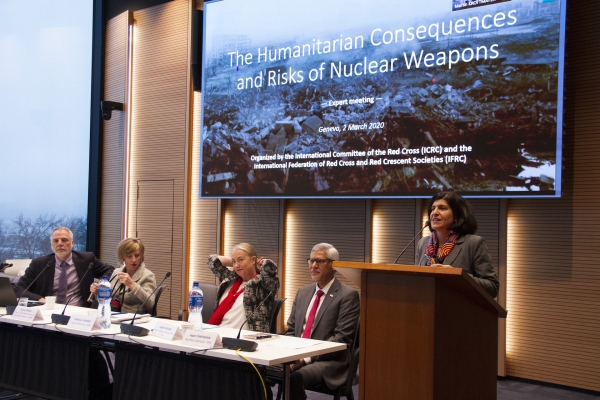The International Committee of the Red Cross (ICRC) is a humanitarian organisation based in Geneva, Switzerland, working around the world to help people affected by conflict and armed violence. In preparation for the Non-Proliferation Treaty (NPT) Review Conference, the Red Cross and Red Crescent Movement brought together experts and government representatives to discuss the humanitarian consequences and increasing risks of nuclear weapons.
The effects of a nuclear weapon, in particular the radioactive fallout brought by the wind, cannot be contained within national borders nor can they be tackled by a single State alone. Following the terrible devastation and suffering of the attacks on Hiroshima and Nagasaki in 1945, the ICRC led its advocacy mission for the prohibition and elimination of nuclear weapons, documenting the effects of nuclear explosions on human health diversified by gender and age, together with the effects on the environment and on medical infrastructures.
Research into the various immediate and long-term impacts of the use and testing of nuclear weapons is important for the understanding of these weapons and for humanitarian preparedness and response. Lack of transparency and failure in taking into account community lifestyles and needs are obstacles that need to be overcomed in future research efforts. Evidence of the humanitarian impacts of nuclear weapons is indeed crucial to assess the legality of their use under international humanitarian law and to protect affected communities.
An important aspect that should not be underestimated is that offering an objective quantification of the risks of nuclear weapons may not be possible and such an ambitious goal may create a sense of overconfidence. There is a risk of giving a false sense of manageability, thus creating the illusion of being able to provide an adequate response to perfectly predictable risks. This is not the case when it comes to nuclear weapons, because their consequences are beyond human control. In other words, the concepts of "luck" and "vulnerability" can better describe the inability to control and manage the possible use of nuclear weapons.
Although nuclear weapons have not been used in armed conflict since 1945, there have been an alarming number of occasions where nuclear weapons have been used almost inadvertently. At the three conferences on the humanitarian impacts of nuclear weapons in 2013 and 2014, organised by the governments of Norway, Mexico and Austria, it was demonstrated that the risks of detonation of a nuclear weapon, whether by accident, miscalculation or design error, stem in particular from: the vulnerability of command and control networks to human error and cyber attacks; maintenance of nuclear arsenals at high alert levels; and the dangers of access to nuclear weapons and related materials by non-state actors.
Over time, nuclear weapons are gaining a more important role in military doctrines and security strategies. The initial global trend towards nuclear reduction is being replaced by a process of modernisation and development of new weapons. The abrogation of treaties, such as the Treaty on Nuclear Intermediate Radius Forces (INF), reduces the transparency and predictability of decision-making processes regarding such dangerous weapons, making their elimination more difficult and creating geopolitical situations with increasingly tense relations.
The ICRC states that preventing the use of nuclear weapons is of the utmost urgency. At the same time, nuclear risk reduction cannot replace the implementation of States' legally binding obligations for nuclear disarmament. The most effective way to ensure that nuclear weapons are never used again is to ban and eliminate them.
To know more, please read:
https://www.icrc.org/en/document/humanitarian-impacts-and-risks-use-nuclear-weapons
Author: Carla Pintor







